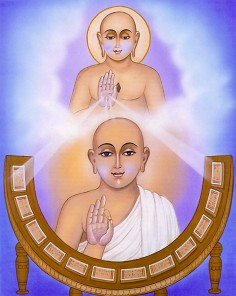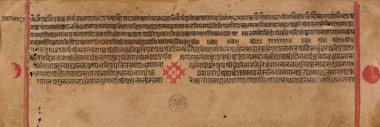Thirty-First Lecture: Mode of Life[1]
I shall declare the mode of life that benefits the soul; by practising it many souls have crossed the ocean of Saṃsāra. (1)
One should desist from one thing, and practise another: desist from neglect of self-control, and practise self-control. (2)
Love and hatred are two evils which produce bad Karman; if a monk always avoids them, he will not stand within the circle (of transmigration). (3)
A monk who always avoids the thrice threefold hurtful, conceited, and delusive acts,[2] will not stand in the circle (of transmigration). (4)
A monk who well bears calamities produced by gods, animals, or men, will not stand, etc. (5)
A monk who always avoids the (four) different kinds of praises,[3] passions, expressions (of the emotions),[4] and (of the four) meditations the two sinful ones, will not stand, etc. (6)
A monk who always exerts himself[5] with regard to the (five) vows, the (five) objects of sense, the (five) Samitis, and (five) actions,[6] will not stand, etc. (7)
A monk who always exerts himself with regard to the six lēśyās,[7] the six kinds of bodies, and the six (regular functions as) eating,[8] will not stand, etc. (8)
A monk who always exerts himself with regard to the (seven) rules of accepting alms,[9] and the seven causes of danger (to other men) will not stand, etc. (9)
A monk who always exerts himself with regard to the (eight) objects of pride,[10] to that which protects his chastity[11], and to the tenfold Law of the monks.[12] (10)
A monk who always exerts himself with regard to the (eleven) duties of the upāsakas, and the (twelve) duties of the bhikṣus,[13] will not stand, etc. (11)
A monk who always exerts himself with regard to the (thirteen) actions (productive of Karman), to the various (fourteen) kinds of living beings, and the (fifteen) places of punishment of the wicked,[14] will not stand, etc. (12)
A monk who always exerts himself with regard to the sixteen Gāthās,[15] and to the (seventeen kinds of) neglect of self-control, will not stand, etc. (13)
A monk who always exerts himself with regard to the (eighteen kinds of) continence, to the (nineteen) jñātādhyayanas,[16] and the (twenty) cases for not concentrating one's thoughts, will not, etc. (14)
A monk who always exerts himself with regard to the twenty-one forbidden[17] actions, and the twenty-two troubles,[18] will not stand, etc. (15)
A monk who always exerts himself with regard to the twenty-three (lectures of the) Sūtrakṛtāṅga, and to the gods whose number exceeds by an unit[19] (the number of the lectures of the Sūtrakṛtāṅga), will not stand, etc. (16)
A monk who always exerts himself with regard to the twenty-five clauses,[20] and (to the recitation of the twenty-six) chapters of the Daśās, etc.,[21] will not stand, etc. (17)
A monk who always exerts himself with regard to the (twenty-seven) virtues of the laity, and the (twenty-eight lectures of the) Prakalpa,[22] will not stand, etc. 08)
A monk who always exerts himself with regard to the (twenty-nine) causes of wrong knowledge, and the (thirty) causes of delusion, will not stand, etc. (19)
A monk who always exerts himself with regard to the (thirty-one) qualities of Siddhas, etc., the (thirty-two) Yogas,[23] and thirty-three āśātanās,[24] will not stand, etc. (20)
A clever monk who always exerts himself with regard to the above-mentioned points, will soon be thoroughly released from the Circle of Births (21)
Thus I say.
This lecture offers many difficulties to the translator, as it contains scarcely more than a dry list of articles of the Jaina faith. To fully understand or interpret it would require an accurate knowledge of the complete religious system of the Jainas, to which we can lay no claim at present. The order in which the articles are given follows the number of their subdivisions. In some cases the number is not given in the Sūtra, but is supplied by the commentary.
Compare XIX, 91, and XXX, 3. Hurtful acts (daṇḍa) are threefold, as referring to thoughts, words, and acts; conceited acts (gārava), as pride of riches, of taste (rasa), and of pleasure or fashion (sātā); delusive acts (śalya), as māyā, nidāna, and mithyādarśana.
Kriyā; they are: 1. kāyikī; 2. adhikaraṇikī; 3. prādvēṣikī; 4. paritāpanikī, and 5. prāṇātipātikī.
From the commentaries I learn two more of these six kāraṇas: vēdana and vaiyāvṛtya. I cannot say which are the remaining three.
Bhikṣudharma. It consists of Nos. 46-49, 26, 27, of Lecture XXIX, truth, purity, poverty, and chastity.
The details given in the commentary (Dēvēndra) partly differ from the description of the twelve duties of Śrāvakas, and the ten duties of Bhikṣus given by Bhandarkar from the Kārttikēyānuprēkṣā, see his Report, p. 114 ff.
Paramādhārmika. My translation is based on the enumeration of fifteen words, among which the names of some well-known hells occur.
The sixteen lectures of the first part of the Sūtrakṛtāṅga, the last of which is called Gāthā, are meant by the sixteen Gāthās. The whole book contains twenty-three lectures as stated in verse 16.
The first śrutaskandha of the Jñātādharmakathā, which contains nineteen adhyayanas, is intended by jñātādhyayana.
Śabala, because they "variegate" the conduct. The actions meant are sitting on an unwiped seat, etc.
Rūpa. The twenty-four gods are: ten Bhavanapatis, eight Vyantaras, five Jyōtiṣkas, one Vaimānika; or the 24 prophets.
The Daśāśrutaskandha, Bṛhat Kalpa, and Vyavahāra Sūtras are meant, which together contain twenty-six uddēśas.
i.e. the Āchārāṅga Sūtra; it now contains but twenty-four lectures, but is said to have originally contained four more, see part i, introduction, p. xlix f. These four lectures were: Mahāparinnā, Ugghāya, Aṇugghāya, ārōvaṇā.
 Ganadhar Sudharma Swami
Ganadhar Sudharma Swami
